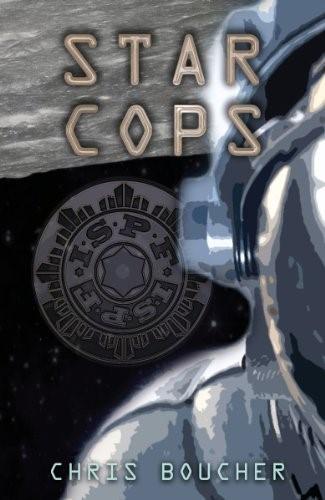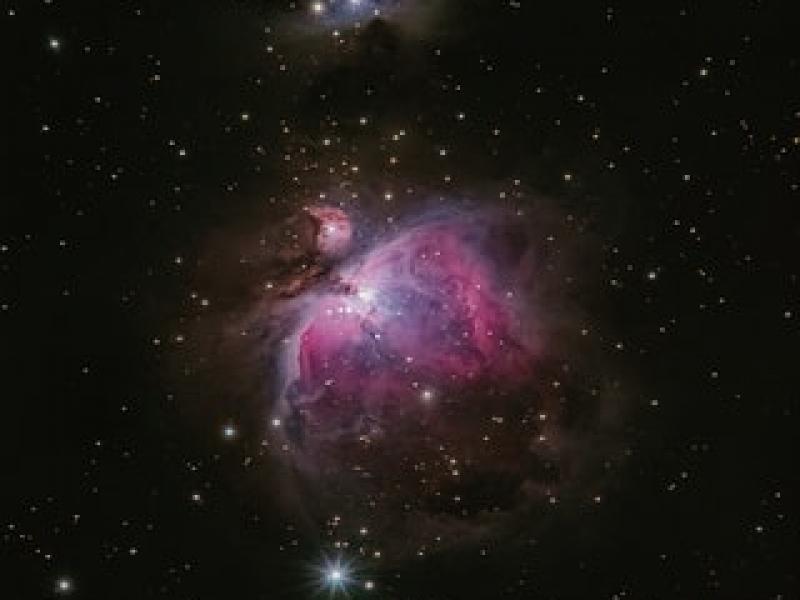Sci-Fi Throwback: Star Cops
Alan from Fingal Libraries remembers the 80s Sci-Fi series Star Cops, and reflects on why the TV series, which posthumously received such lavish praise, failed with both critics and audiences at the time of its broadcast.

Star Cops ebook
Star Cops, a BBC science fiction series which aired in 1987, has been described by TV Zone magazine as "excellent science fiction". In 1999, when science fiction magazine SFX assembled a panel of celebrated figures from the field to compile a list of the fifty greatest science fiction television series of all time, Star Cops was placed thirteenth on the list. SFX described Star Cops as "the SF TV show SF writers love...it's as close as TV will ever get to producing proper written SF".
Yet at the time of its airing, Star Cops received largely negative reviews, achieved only poor viewing figures and has never been repeated by the BBC. How did a science fiction series, which posthumously received such lavish praise, fail with both critics and audiences at the time of its broadcast?.
The story of Star Cops could perhaps be described as one of defeat snatched from the jaws of victory. It begins with the man who devised the series, Chris Boucher.
Chris Boucher is a British television screenwriter and script editor, best known for his contributions to science fiction and crime dramas.
He wrote three Doctor Who serials in the late 1970s and was the script editor for the legendary science fiction series Blakes 7 for the entirety of its four-series run. He also wrote several episodes himself, including the infamous final episode Blake, regarded by many as the series' finest hour.
He also contributed, as script editor and screenwriter, to popular series such as Shoestring, Juliet Bravo, and Bergerac.
Chris Boucher successfully pitched his idea for a series, which would combine elements of both the science fiction and crime genres, to the BBC and in August 1986 production began on the show Star Cops.
Star Cops is set in the year 2027, when interplanetary travel is commonplace and colonisation of the Solar System is underway. Five manned space stations orbit Earth and bases have been established on the moon and Mars. Thousands now live and work in space.
The International Space Police Force (ISPF) provide law and order, consisting of part-time volunteers nicknamed "Star Cops". However, the ISPF is now to be put on a full-time footing and a new Commander, Nathan Spring (played by David Calder), has been appointed to oversee this.
Star Cops followed Spring's efforts and struggles in his new role, including dealing with corruption among officers, establishing a base of operations on the Moonbase and striving to extend the operations of the Star Cops into the American space stations and the colonies on Mars, and of course investigating a range of crimes.
Spring's colleagues included his second in command, American Chief Superintendent David Theroux and the sexist Inspector Colin Davis. A combative relationship existed between Spring and Australian Pal Kenzy while Doctor Anna Shoun was a general physician from Japan.
Star Cops always aimed for realism and accuracy in how it depicted mankind's operations in space and ensuing hazards such as spacesuit malfunctions, and even sought advice and guidance from NASA and other space agencies.
Boucher had intended to write all ten episodes himself, but time pressures resulted in him providing five scripts. The remaining five scripts were shared between John Collee and Philip Martin, though industrial action at the B.B.C meant that ultimately only nine episodes were produced.
Evageny Gridneff was chosen to produce the series. Problems arose from the outset when he instructed Boucher to rewrite all his scripts at their first meeting.
Boucher had planned for all the scenes set on earth to be shot on film on location, and for all the scenes with a space setting to be recorded on video in the studio. With this approach, all the space scenes would benefit from a unique appearance. Gridneff, however, dispensed with this innovative idea and decreed that videotape would be used to record the entire series.
The production continued to be problematic when the character of Doctor Anna Shoun was introduced by Gridjeff without any consultation with Chris Boucher.
Star Cops was assigned two directors, Christopher Baker and Graeme Harper. Unfortunately, both directors took very different approaches in terms of the aesthetics and atmosphere of the episodes which resulted in a jarring effect to the series, with some episodes favouring brightly lit sets while others conveyed a murkier, down at heel appearance.
Justin Hayward of the Moody Blues contributed the show's theme song "It Won't be Easy". While Gridjeff hoped that the easy listening song would entice viewers to the show, it attracted much damning criticism, with detractors including author and critic Kim Newman and SFX Magazine, while Chris Boucher felt that the show's incidental music wasn't appropriate.
But it was arguably the scheduling for Star Cops which truly robbed the new series of a potential audience. It was broadcast on BBC2 on Monday nights at 8.30pm. At this time, viewers who wished to view Star Cops would have had to miss out on two programmes on BBC1. Boucher and actor David Calder were highly critical of the time slot.
Star Cops was also allocated a very unfavourable time of year for its broadcast - the summer months of July and August (the first episode was broadcast on 6th July), a disadvantageous time for programmes when viewing figures are traditionally low.
Resultingly, Star Cops performed poorly in the ratings. Reactions from critics were also largely unfavourable. It surely came as little surprise to all involved when the BBC declined to commission a second series.
Indeed, this period (the mid - late eighties) was a notably difficult time for science fiction on the BBC. During this period, the long running Doctor Who would be put on an 18-month hiatus from television screens while The Tripods was cruelly cancelled before its third and final series went into production. Star Cops sadly became another casualty of the era.
However, as can be seen from the opening paragraph, Star Cops has subsequently, and justly, received some critical reassessment. Kim Newman has gone so far as to say "If it had come back for another couple of seasons it might well have been the BBC's best science fiction show".
Chris Boucher later novelised his five scripts, while, in 2004, the complete series was finally released on DVD, in a package which also included a documentary and interviews with Chris Boucher and others involved in the production.
Perhaps, after all these years, Star Cops is finally finding the audience it always deserved.
